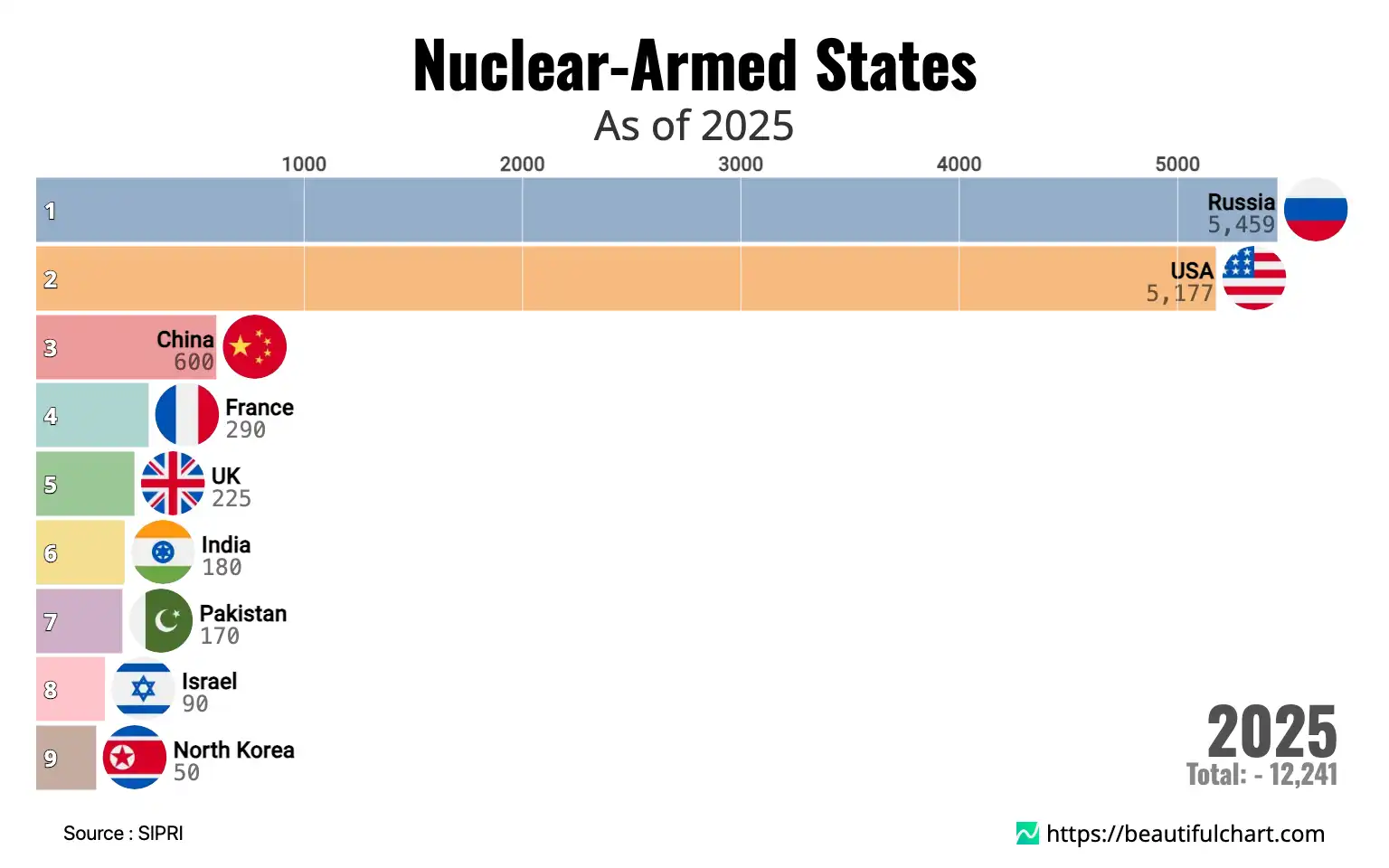The possession of nuclear weapons continues to be a defining factor in international relations and global security. By 2025, several nations are anticipated to maintain or enhance their nuclear capabilities, significantly influencing strategic stability and power dynamics worldwide. This analysis delves into the countries confirmed to possess nuclear arsenals and the far-reaching implications their existence has for deterrence, non-proliferation efforts, and overall international peace.

Nuclear deterrence is a military theory where the threat of using nuclear weapons prevents an adversary from attacking. It operates on the principle of mutually assured destruction (MAD), ensuring that any first strike would result in devastating retaliation for all parties involved, thus discouraging aggression.
The landscape of nuclear-armed states remains a central pillar of global security discussions, reflecting a complex interplay of national defense strategies, regional rivalries, and international treaties. As of 2025, a select group of nations openly acknowledge possessing nuclear weapons, while others are suspected of having developed or are actively pursuing such capabilities. The five permanent members of the United Nations Security Council—China, France, Russia, the United Kingdom, and the United States—are officially recognized as nuclear-weapon states under the Treaty on the Non-Proliferation of Nuclear Weapons (NPT).
Beyond these five, several other countries have acquired nuclear weapons, including India, Pakistan, and North Korea. Israel is widely believed to possess nuclear weapons, though it maintains a policy of deliberate ambiguity. Each of these nations holds its nuclear arsenal for distinct strategic reasons, often citing national security, deterrence against perceived threats, or regional power balance as primary motivators.
For instance, the United States and Russia possess the largest arsenals, inherited largely from the Cold War era. Their strategic doctrines are heavily influenced by the concept of mutually assured destruction (MAD), aiming to deter a first strike through the threat of devastating retaliation. Both nations have engaged in arms control treaties, such as the New START Treaty, to limit their deployed strategic nuclear warheads, though the future of such agreements remains a subject of ongoing debate and negotiation.
China's nuclear program has seen significant modernization and expansion, shifting from a minimal deterrence posture to a more robust and survivable force. This development is often viewed through the lens of strategic competition, particularly with the United States, as Beijing seeks to ensure its second-strike capability and enhance its overall geopolitical standing. France and the United Kingdom, while possessing smaller arsenals, maintain independent nuclear deterrents crucial to their national defense policies and European security.
In South Asia, India and Pakistan developed nuclear weapons outside the NPT framework, driven by long-standing regional hostilities. Their nuclear capabilities are primarily focused on deterring each other, creating a unique and often tense regional security dynamic. North Korea's nuclear program, on the other hand, has evolved rapidly despite international sanctions and condemnation. Pyongyang views its nuclear weapons as essential for regime survival and a critical tool for leverage in international negotiations, posing a significant challenge to the non-proliferation regime.
The existence of these nuclear arsenals profoundly impacts international relations. It underpins the concept of strategic stability, where the immense destructive power of nuclear weapons theoretically discourages large-scale conventional warfare between major powers. However, it also presents persistent risks, including the potential for accidental use, miscalculation during crises, or the proliferation of nuclear technology to non-state actors.
Efforts to strengthen the global non-proliferation regime continue to be paramount. The NPT, despite its limitations, remains the cornerstone of these efforts, seeking to prevent the spread of nuclear weapons while promoting nuclear disarmament and the peaceful use of nuclear energy. Challenges to this regime include non-compliance, the development of dual-use technologies, and the persistent security dilemmas that lead some states to pursue nuclear capabilities.
Furthermore, the emergence of new technologies, such as advanced missile defense systems, hypersonic weapons, and cyber warfare capabilities, introduces new complexities into nuclear strategy. These developments can potentially destabilize deterrence by creating perceptions of vulnerability or advantage, necessitating ongoing dialogue and adaptive arms control frameworks. The role of artificial intelligence in command and control systems also raises profound ethical and security questions.
Ultimately, the presence of nuclear weapons ensures that international security will remain perpetually intertwined with the delicate balance of deterrence and the imperative of non-proliferation. The year 2025 marks a period where these critical issues continue to shape global policy and strategic thinking, emphasizing the ongoing need for diplomatic engagement, risk reduction measures, and a commitment to arms control.
Key Takeaways
Global Nuclear Landscape in 2025
- The five recognized nuclear-weapon states under the NPT (China, France, Russia, UK, US) continue to be central players in global nuclear strategy.
- India, Pakistan, and North Korea operate outside the NPT framework, maintaining nuclear arsenals driven by distinct regional security concerns.
- Israel maintains a policy of deliberate ambiguity regarding its widely suspected nuclear capabilities.
Strategic Implications and Deterrence
- Nuclear weapons remain a core element of national defense and foreign policy for possessing states, primarily serving as ultimate deterrents against large-scale aggression.
- The concept of mutually assured destruction (MAD) continues to influence the strategic thinking of major nuclear powers, guiding their arms control and defense postures.
- Modernization of nuclear arsenals and the development of new military technologies, such as hypersonic weapons, are introducing new complexities into existing deterrence frameworks.
Challenges to Non-Proliferation
- The Treaty on the Non-Proliferation of Nuclear Weapons (NPT) faces ongoing challenges from states pursuing nuclear capabilities and issues of compliance.
- Efforts to prevent the spread of nuclear weapons technology are complicated by dual-use technologies and the perceived security imperatives of some nations.
- International diplomacy and arms control agreements are crucial for managing nuclear risks and promoting stability in an evolving geopolitical environment.
| Rank | Name | Indicator |
|---|---|---|
1 | 5,459 | |
2 | 5,177 | |
3 | 600 | |
4 | 290 | |
5 | 225 | |
6 | 180 | |
7 | 170 | |
8 | 90 | |
9 | 50 |





